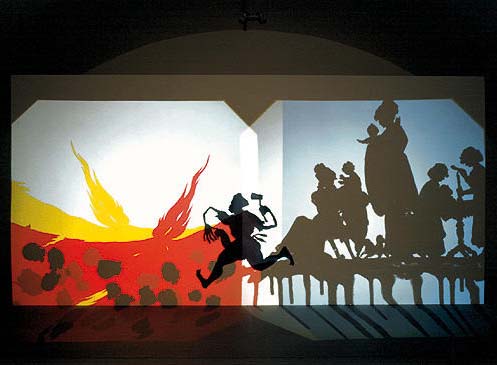Kara Walker
dal 5/9/2002 al 26/10/2002
Segnalato da
5/9/2002
Kara Walker
Galerie Max Hetzler, Berlin
Nat Turner's Revelation (an Important Lesson from our Negro Past You will Likely Forget to Remember)

Galerie Max Hetzler is pleased to present a new wall installation by
American artist Kara Walker. Using a paper cut-out technique, Walker
creates narrative sequences that address "the often subtle and
uncomfortable ways racism and sexist stereotypes influence and script
our everyday lives." Her sources for these deceptively simple scenes
include stereotypical characters from African American history, as well
as 19th century Slave Narratives, and even attitudes common in
today's Politically Correct America.
Walker began using the silhouette format in the early 90s. Her unique
technique derives from the tradition of shadow theater and the genre
of silhouetted profile portraits that were popular in the 19th century.
The cut-out silhouette offers Walker the ideal form for her musings;
much like stereotypes themselves, the medium reduces figures to
oversimplified standardized images.
Nat Turner's Revelation (an Important Lesson from our Negro Past You
will Likely Forget to Remember) was inspired by the life of Nat Turner,
a self-made preacher born into slavery at the turn of the 19th
century. Taking his cue from religious visions, in 1831 Turner led a
slave uprising known as the Southhampton, Virginia Slave Revolt.
During this revolt Turner and about 40 followers killed more than 55
men, women and children, including Turner's master and his family.
Turner was hanged for his crimes, but not before hundreds of innocent
black slaves were executed in retaliation.
Walker's installation subtly references this chapter in U.S. history so
that the viewer, who most likely is not aware of the details of Turner's
Rebellion, is left to construct their own narrative. How one interprets
the work often says as much about the individual as it does about the
work itself. In that way, Walker's morphing forms operate much like
Rorschach blots.
In the tradition of minstrel shows, Walker challenges racial stereotypes
using sarcasm and humor to soften the hard truths she depicts.
Ultimately her sambos, mammies, slave mistresses and masters
function as a reminder of how cultural dogmas are formed, and a
challenge to our everyday thoughts and actions. We are all implicated
in Walker's subversive dramas.
Born in California in 1969, Kara Walker studied at the Atlanta College of
Art in Georgia and the Rhode Island School of Arts in Providence. She
has had numerous solo and group exhibitions in the United States and
Europe, and recently represented the United States at the 25th Sao
Paulo Biennale. Walker lives and works in New York, where she holds a
professorship at Columbia University.
Galerie Max Hetzler Holzmarktstrasse 15-18 Berlin-Mitte
Open Tuesday to Saturday, 11am to 6pm.
Kara Walker in conversation with Hans-Ulrich Obrist in leaflet of the
museum in progress, in co-operation with the Wiener Staatsoper,
September 1998.



